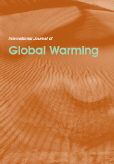
International Journal of Global Warming
Scope & Guideline
Transforming Data into Actionable Climate Strategies
Introduction
Aims and Scopes
- Climate Change Mitigation Strategies:
Research addressing various strategies and technologies aimed at reducing greenhouse gas emissions, including energy efficiency improvements, renewable energy adoption, and innovative carbon capture methods. - Impact Assessments of Climate Change:
Studies evaluating the effects of climate change on different sectors such as agriculture, water resources, and urban environments, providing insights into vulnerabilities and adaptation needs. - Sustainable Development Practices:
Exploration of sustainable practices across industries and sectors, including waste management, water conservation, and sustainable agricultural practices, emphasizing the importance of integrating sustainability into economic development. - Technological Innovations:
Research focused on new technologies and methodologies, such as machine learning, IoT, and AI, that enhance environmental monitoring, energy management, and resource efficiency. - Environmental Policy and Governance:
Analyses of the role of policies, governance frameworks, and international agreements in addressing climate change, promoting best practices for climate governance.
Trending and Emerging
- Integration of Artificial Intelligence and Big Data:
An increasing trend towards utilizing AI and big data analytics for climate modeling, energy management, and environmental monitoring, showcasing the potential of technology in enhancing sustainability efforts. - Resilience and Adaptation Strategies:
A growing focus on resilience-building and adaptation strategies in response to climate impacts, particularly in vulnerable regions, emphasizing the importance of proactive measures. - Circular Economy and Waste Management:
Emerging research on circular economy principles, including waste reduction, recycling, and sustainable resource management, reflects a shift towards holistic approaches to sustainability. - Climate Change and Public Health:
An increasing intersection of climate change research with public health, exploring the health impacts of climate change and the need for integrated health and environmental policies. - Urban Climate Adaptation:
A trend towards studying urban areas' responses to climate change, focusing on green infrastructure, urban heat islands, and sustainable urban planning to mitigate climate impacts.
Declining or Waning
- Traditional Energy Sources:
Research focusing primarily on fossil fuels and their direct impacts on climate change has seen a decrease, as the focus shifts towards renewable energy and sustainable alternatives. - General Climate Change Awareness:
Broad studies on climate change awareness without specific action-oriented solutions have become less frequent, with a more pronounced emphasis now on actionable insights and technological solutions. - Conventional Agricultural Practices:
There is a waning interest in traditional agricultural methods without sustainable practices, as the literature increasingly highlights the need for sustainable agriculture and innovative approaches to food production.
Similar Journals

Environmental Chemistry Letters
Catalyzing change through interdisciplinary research.Environmental Chemistry Letters, published by Springer Heidelberg, stands at the forefront of interdisciplinary research within the field of Environmental Chemistry. Since its inception in 2003, this esteemed journal has provided a dynamic platform for the dissemination of innovative studies and groundbreaking findings, contributing significantly to the understanding of chemical processes affecting the environment. With an impressive impact factor and ranking third out of 147 journals in Environmental Chemistry (98th percentile as per Scopus), it consistently attracts high-quality submissions from researchers around the globe. The journal maintains a Q1 category rank as of 2023, underscoring its prominent position in scholarly discourse. Environmental Chemistry Letters is dedicated to advancing knowledge on contemporary environmental issues, fostering solutions to mitigate chemical pollution, and promoting sustainable practices across various sectors. Researchers, professionals, and students alike will find invaluable resources within its pages as it continues to illuminate the path toward environmental sustainability.
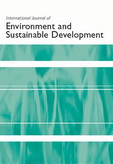
International Journal of Environment and Sustainable Development
Shaping the future of sustainable practices.The International Journal of Environment and Sustainable Development, published by INDERSCIENCE ENTERPRISES LTD, serves as a vital platform for researchers, practitioners, and policymakers engaged in the multidisciplinary fields of geography, renewable energy, and environmental sustainability. With an ISSN of 1474-6778 and an E-ISSN of 1478-7466, this journal has been disseminating critical research since its inception in 2002 and continues to expand its scope through 2024. Recognized within the Q3 quartile in Geography, Planning and Development and Q4 in both Management, Monitoring, Policy and Law and Renewable Energy, Sustainability and the Environment, it provides valuable insights into contemporary issues affecting our planet. While access options are limited to non-open access formats, the journal remains essential for those seeking to enhance their understanding of sustainable development practices and policies in a global context. The International Journal of Environment and Sustainable Development is not only an academic repository but also a catalyst for dialogue and innovation within the environmental sciences.

ENVIRONMENTAL MANAGEMENT
Driving change through evidence-based environmental strategies.ENVIRONMENTAL MANAGEMENT, published by Springer, stands at the forefront of advancing sustainability and ecological stewardship in the fields of Ecology, Global and Planetary Change, and Pollution. With an impressive tracking history from 1977 to 2024 and prestigious quartile rankings reflecting its significant impact (Q1 in Ecology and Q2 in both Global and Planetary Change and Pollution), this journal engages a wide range of stakeholders, including researchers, policymakers, and environmental professionals. The journal is a vital resource for those dedicated to addressing pressing global environmental challenges, publishing rigorous interdisciplinary research that informs policy and practice. While it does not offer open access, its content remains accessible through institutional subscriptions. Located in the heart of New York, ENVIRONMENTAL MANAGEMENT is dedicated to fostering a substantive dialogue on innovative approaches to environmental preservation and management.
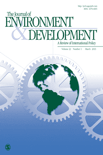
Journal of Environment & Development
Transforming Knowledge into Sustainable SolutionsJournal of Environment & Development is a leading scholarly journal published by SAGE Publications Inc, aimed at fostering an in-depth understanding of both environmental challenges and developmental strategies. With an ISSN of 1070-4965 and E-ISSN 1552-5465, this journal enjoys a distinguished reputation, reflected in its impressive impact factor and Q1 rankings in the fields of Development, Geography, Planning and Development, as well as its placement in the Q2 category for Management, Monitoring, Policy and Law in 2023. Since its inception in 1992, the journal has provided a vital platform for researchers, policymakers, and practitioners to share innovative ideas and impactful research findings. With SCOPUS ranking it among the top journals in its categories, the Journal of Environment & Development is essential for anyone engaged in addressing the complex interplay between environmental sustainability and human development. This journal is particularly valuable for those pursuing interdisciplinary approaches to tackle pressing societal issues. Although it is not open access, its reputable content remains crucial for those invested in these dynamic fields.

International Energy Journal
Transforming Ideas into Energy SolutionsInternational Energy Journal is a pivotal academic publication dedicated to advancing research and knowledge in the dynamic field of energy. Published by the REGIONAL ENERGY RESOURCES INFO CENTER in Thailand, this journal focuses on a broad spectrum of energy topics, including renewable sources, energy policy, and sustainable practices. With a recognized Q3 category ranking in the field of Energy (Miscellaneous) and a Scopus rank of #47 out of 73, it serves as a critical platform for researchers, professionals, and students eager to contribute to and stay abreast of the latest trends and developments in energy science. The journal, which has been in continuous publication since 2000, operates on an open-access basis, ensuring that its findings are accessible to a global audience. Researchers looking to publish their work in a well-respected journal with a growing impact factor will find the International Energy Journal to be an excellent choice for disseminating their studies and innovations in this essential field.
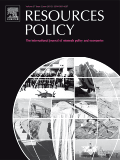
Resources Policy
Leading the Dialogue on Resource Economics and LawResources Policy, published by ELSEVIER SCI LTD, is a prestigious journal that has been at the forefront of advancing knowledge in the fields of Economics, Law, and Sociology since its inception in 1974. With an impressive Q1 ranking in multiple disciplines—including Economics and Econometrics, Law, Management, Monitoring, Policy and Law, and Sociology and Political Science—this journal showcases high-impact research and insights that are vital for academics, policymakers, and practitioners alike. With Scopus rankings placing it in the top percentiles of its respective categories, Resources Policy fosters interdisciplinary dialogue, promoting innovative solutions and policies concerning the sustainable management and use of resources. While currently not an open-access publication, the journal ensures that its rich content is accessible to those pursuing rigorous research and professional excellence. As we approach its 50th anniversary in 2024, Resources Policy continues to be an essential platform for critical discussions, evaluation, and advancements in resource management.

ENVIRONMENTAL SCIENCE AND POLLUTION RESEARCH
Driving Innovation in Pollution Research and ManagementEnvironmental Science and Pollution Research is a premier international journal published by Springer Heidelberg, dedicated to advancing knowledge in the field of environmental science and pollution. With an impressive impact factor reflecting its vital contributions to research, the journal is categorized in the top quartiles (Q1 and Q2) across several domains, including Health, Toxicology and Mutagenesis, and Environmental Chemistry. Established in 1994, it continues to be a critical resource for researchers, professionals, and students focusing on pressing environmental issues. The journal provides an insightful platform for disseminating significant findings related to pollution and its effects on health and the environment, contributing to a better understanding and resolution of these challenges. While it currently does not offer Open Access options, its inclusion in prominent rankings, such as the Scopus rankings, underscores its reputation and influence within the scientific community.

Nature Climate Change
Leading the Charge in Climate Change ScholarshipNature Climate Change, published by NATURE PORTFOLIO, is a leading peer-reviewed journal in the fields of Environmental Science and Social Sciences. Established in 2011, this journal has garnered significant acclaim, with an impressive impact factor reflected in its 2023 Q1 ranking in both categories, making it rank #1 in Environmental Science (miscellaneous) and Social Sciences (miscellaneous), placing it in the 99th percentile. The journal aims to provide a comprehensive platform for the latest research and developments related to the social, economic, and environmental dimensions of climate change, thus fostering interdisciplinary dialogue and collaboration. Researchers, professionals, and students alike benefit from the journal's commitment to addressing the urgent challenges posed by climate change through innovative research, reviews, and commentary. Although not open access, the journal remains pivotal in shaping global discussions and policies surrounding climate issues. For those seeking indicative research trends and influences in climate change scholarship, Nature Climate Change serves as an essential resource that highlights innovative solutions and actionable insights.
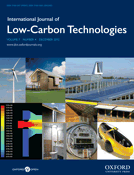
International Journal of Low-Carbon Technologies
Empowering the quest for sustainable practices.International Journal of Low-Carbon Technologies is a premier, peer-reviewed publication dedicated to advancing the field of low-carbon technologies and sustainable practices. Published by OXFORD UNIVERSITY PRESS, this journal serves as a vital resource for researchers, professionals, and students alike, providing insightful research and innovative solutions for a sustainable future. With its ISSN 1748-1317 and E-ISSN 1748-1325, the journal is recognized globally, boasting an impressive impact in its categories, including a Q1 ranking in Architecture and Q2 rankings in both Civil and Structural Engineering and Environmental Science as of 2023. It is open access since 2014, facilitating the dissemination of knowledge to a wider audience, and encourages critical discourse on environmental sustainability across converging disciplines. The journal’s Scopus rankings reflecting its standing—ranked #23 in Architecture (88th percentile) and #130 in Civil and Structural Engineering—underscore its importance in driving forward the scientific agenda in low-carbon technologies. As we journey from 2007 towards 2024, the International Journal of Low-Carbon Technologies remains a cornerstone for research and dialogue in reducing carbon footprints and promoting resilient infrastructure.

ACS Environmental Au
Driving Collaborative Initiatives in Environmental ScienceACS Environmental Au is a leading open-access journal published by the American Chemical Society (ACS), dedicated to advancing research in the environmental sciences. Since its inception in 2021, this journal has quickly established itself in the highly competitive landscape of environmental research, achieving Q1 status across multiple categories—Environmental Engineering, Environmental Science (Miscellaneous), and Water Science and Technology. With a strong Scopus ranking, including Rank #38 in Water Science and Technology representing the top 85th percentile, ACS Environmental Au serves as a vital platform for disseminating high-quality research and innovative solutions to pressing environmental challenges. It is particularly notable for its commitment to accessibility, providing researchers, professionals, and students with open access to critical findings that support sustainable development and environmental stewardship. This journal not only emphasizes rigorous scientific inquiry but also seeks to provoke thoughtful discourse and collaborative initiatives that address global environmental issues.